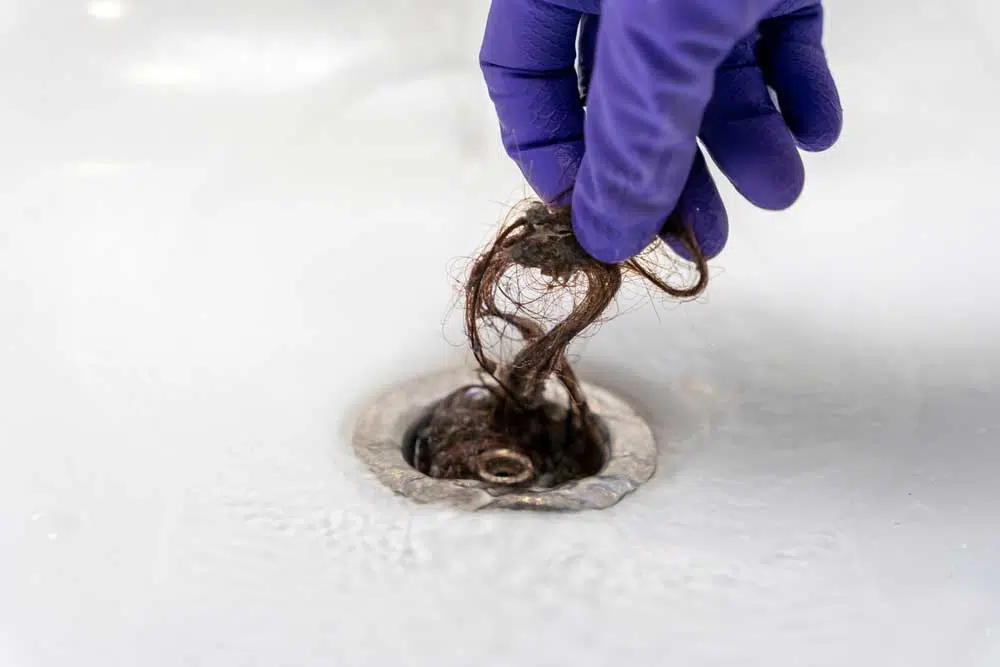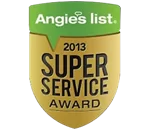Hair clogs in drains are a common nuisance, leading many to look for ways to solve the problem. Drain cleaners are a popular choice, but do they truly dissolve hair, and what are the implications for your plumbing?
Below, we’ll look at the types of drain cleaners available, their impact on pipes, and alternative methods for tackling hair clogs. From chemical-based solutions to natural alternatives, we’ll explore the effectiveness of each approach. Additionally, we’ll provide insights into preventing hair clogs and address frequently asked questions surrounding drain cleaners and hair dissolving.
Table of Contents:
- Types of Drain Cleaners Available on the Market
- How Drain Cleaner Can Affect Your Pipes
- Alternatives to Using A Chemical-Based Drain Cleaner for Dissolving Hair in Drains
- How to Prevent Hair Clogs in Your Drain
- Hair Clog FAQs
- Contact FORD’S Plumbing for Getting Rid of Hair Clogs
Types of Drain Cleaners Available on the Market
1. Chemical-Based Drain Cleaners
- Composition: Most chemical drain cleaners contain either strong alkaline or acidic compounds.
- Mechanism: These chemicals work by generating heat, which helps dissolve and break down organic matter, including hair.
- Popular Brands: Drano, Liquid-Plumr, Hair Clog Blaster.
2. Enzymatic Drain Cleaners
- Composition: These cleaners use enzymes or bacteria that naturally digest organic material.
- Mechanism: Enzymes break down hair and other organic substances into smaller, water-soluble particles.
- Popular Brands: Bio-Clean, Green Gobbler.
3. Home Remedies
- Composition: Baking soda, vinegar, and hot water are commonly used home remedies.
- Mechanism: The fizzing action of baking soda and vinegar can help dislodge hair, while hot water aids in flushing it away.
How Drain Cleaner Can Affect Your Pipes
While drain cleaners can be effective in dissolving hair clogs, they come with potential drawbacks:
1. Corrosion
Chemical drain cleaners may corrode pipes over time, especially if used frequently or in excessive amounts.
2. Environmental Impact
Chemical-based cleaners can have adverse effects on the environment, posing risks when disposed of improperly.
3. Safety Concerns
Handling and inhaling fumes from chemical drain cleaners can be hazardous, requiring careful usage and adequate ventilation.
Alternatives to Using A Chemical-Based Drain Cleaner for Dissolving Hair in Drains
1. Enzymatic Cleaners
- Advantages: Enzymatic cleaners offer an eco-friendly and less corrosive alternative. They work gradually but effectively over time.
2. Baking Soda and Vinegar
- Process: Pour a cup of baking soda down the drain, followed by a cup of vinegar. Allow it to fizz, then flush with hot water.
- Advantages: This natural method is safe for pipes and the environment.
3. Plumbing Snake or Auger
- Process: Use a plumbing snake to physically break up and remove hair clogs.
- Advantages: This method is mechanical and doesn’t rely on chemicals, making it safe for pipes.
4. Hot Water Flushing
- Process: Regularly flush drains with hot water to help prevent hair buildup.
- Advantages: This preventive measure is simple, cost-effective, and environmentally friendly.
5. Mesh Drain Covers:
- Installation: Place mesh covers over drains to catch hair before it enters the plumbing.
- Advantages: Prevents hair clogs at the source, reducing the need for unclogging solutions.
How to Prevent Hair Clogs in Your Drain
1. Use Mesh Drain Covers
Install mesh covers in sinks and showers to trap hair before it goes down the drain.
2. Regular Maintenance
Implement routine cleaning with enzymatic cleaners to prevent hair buildup.
3. Brush or Comb Before Showering
Minimize loose hair by brushing or combing before showering, reducing the amount that ends up in drains.
4. Avoid Excessive Product Usage
Limit the use of hair products that contribute to buildup and clogs.
5. Professional Drain Cleaning
Schedule periodic professional drain cleanings to ensure optimal plumbing function.
Hair Clog FAQs
Q: Does Drain Cleaner Dissolve Hair Completely?
While drain cleaners can dissolve hair to some extent, complete dissolution may require multiple applications or physical removal methods.
Q: What Chemical Dissolves Hair?
Chemicals like sodium hydroxide (lye) found in many drain cleaners can dissolve hair. However, these chemicals come with potential drawbacks.
Q: Does Hydrogen Peroxide Dissolve Hair?
Hydrogen peroxide may help break down some organic matter, but its effectiveness on hair clogs is minimal.
Q: What Dissolves Hair Naturally?
Enzymatic cleaners, baking soda, vinegar, and hot water are natural options for dissolving hair without using harsh chemicals.
Q: Will Drano Get Rid Of Hair Clogs?
Drano and similar products can be effective, but their corrosive nature raises concerns about long-term impact on pipes and the environment.
Contact FORD’S Plumbing for Getting Rid of Hair Clogs
The quest for dissolving hair clogs requires a careful balance between effectiveness and the potential consequences of using drain cleaners. While chemical-based solutions offer immediate relief, they may pose risks to pipes and the environment. Enzymatic cleaners and natural alternatives provide a safer approach, with preventive measures like mesh drain covers and regular maintenance offering long-term solutions.
If you have a stubborn drain clog, be sure to call FORD’S Plumbing and Heating today and we’ll get it cleared up ASAP!



















